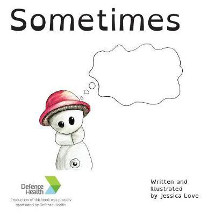Sometimes by Jessica Love

Echo Books, 2017. ISBN 9780995436435
Sometimes when you're gone I wonder why your job seems more
important to you . . .than me.
Sometimes when you're gone I get upset and angry when you miss
things that are important to me.
Sometimes I look at what you do and I realise that you don't want to
leave . . . but by making our lives harder, you are making other
people's lives better.
But even with that understanding, it doesn't make the life of a
child with a parent in the Defence Forces or any other profession
which necessitates prolonged absences any easier.
This is poignant true story based on the 16 year-old author's own
experiences of being a child in a military family grappling with the
absence of a loved parent. It was her way of telling her dad about
her feelings while he was away and her confusion when he came home
as the family had to adjust to another routine. In an interview with
the Canberra
Times she says, "When I showed it to Dad, it wasn't really
anything we had discussed before . It was quite a shock to him . . .
But Jess didn't just write this book for her dad, she wrote it for
all children of Defence families and in a letter to them she tries
to reassure them that their feelings are common and normal, they are
not alone and even providing a page for them to write their own
ending to the sentence, Sometimes when you're gone . . .
Many of us have taught many children from military families who have
struggled with having a parent deployed and there has been an
expectation that they will "soldier on" and manage the separation
and the emotions that go with it. But this book has a wider
application than just military families - many of our students will
have parents away, either permanently or temporarily - and in
sensitive hands this could be the perfect opportunity to support
them by getting them to open up about their feelings; to help them
understand that they are not alone and it's normal to feel resentful
at times and they don't have to feel guilty; to help them help their
parents understand the impact of the separation because often
parents are so busy being adults that they forget what it's like to
be a bewildered kid.
This is one for all teachers, not just counsellors, and deserves a
wide audience among our profession - it has the power to change
lives.
Barbara Braxton